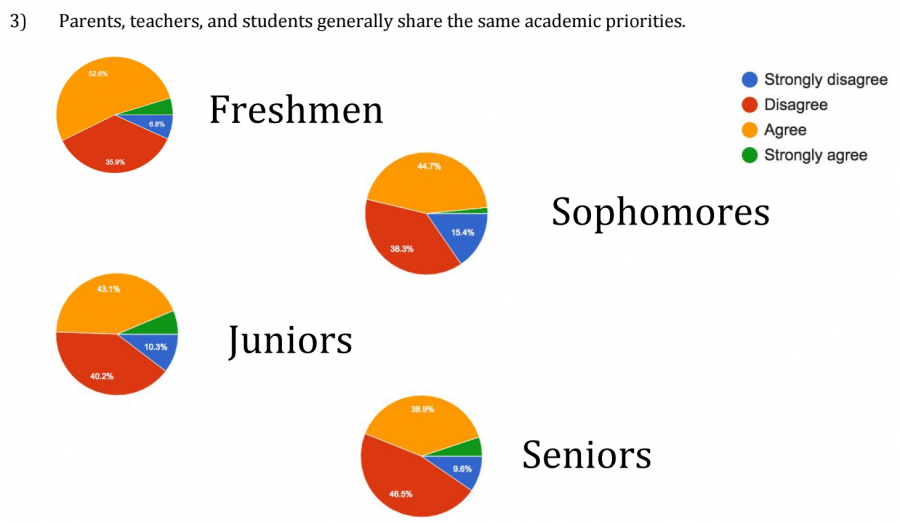Honor Council survey reveals nuances of opinion between different grades
Courtesy of Honor Council
Honor Council posted the results from their survey on a bulletin board in Main. This series of four pie charts displays student responses to the prompt “Parents, teachers and students generally share the same academic priorities.”
February 21, 2017
Honor Council distributed a survey to the student body earlier this month addressing the causes of, types of and remedies for Honor Code violations. The results were separated by grade so each class could be compared.
More freshmen, sophomores and seniors say that they strongly disagree with being empowered to address honor problems through Suggestion Ox than through any other venue. The most-strongly disagreed venue for juniors is the administration.
More seniors strongly agree with feeling empowered to address honor issues through their advisors. Other grades feel most empowered to address them through the advisor relatively through strong agreement.
57.3 percent of freshmen, 46.3 percent of sophomores, 49.5 percent of juniors and 43.9 percent of seniors agree that parents, teachers and students generally have the same academic priorities.
According to freshmen, the most agreed-upon causes of academic dishonesty are time constraints or inadequate preparation, peer pressure and unclear teacher or department policy. Sophomores, juniors and seniors, on the other hand, attribute academic dishonesty to time constraints or inadequate preparation, peer pressure and parental pressure.
This piece was originally published in the pages of The Winged Post on February 21, 2017.


















![“[Building nerf blasters] became this outlet of creativity for me that hasn't been matched by anything else. The process [of] making a build complete to your desire is such a painstakingly difficult process, but I've had to learn from [the skills needed from] soldering to proper painting. There's so many different options for everything, if you think about it, it exists. The best part is [that] if it doesn't exist, you can build it yourself," Ishaan Parate said.](https://harkeraquila.com/wp-content/uploads/2022/08/DSC_8149-900x604.jpg)




![“When I came into high school, I was ready to be a follower. But DECA was a game changer for me. It helped me overcome my fear of public speaking, and it's played such a major role in who I've become today. To be able to successfully lead a chapter of 150 students, an officer team and be one of the upperclassmen I once really admired is something I'm [really] proud of,” Anvitha Tummala ('21) said.](https://harkeraquila.com/wp-content/uploads/2021/07/Screen-Shot-2021-07-25-at-9.50.05-AM-900x594.png)







![“I think getting up in the morning and having a sense of purpose [is exciting]. I think without a certain amount of drive, life is kind of obsolete and mundane, and I think having that every single day is what makes each day unique and kind of makes life exciting,” Neymika Jain (12) said.](https://harkeraquila.com/wp-content/uploads/2017/06/Screen-Shot-2017-06-03-at-4.54.16-PM.png)








![“My slogan is ‘slow feet, don’t eat, and I’m hungry.’ You need to run fast to get where you are–you aren't going to get those championships if you aren't fast,” Angel Cervantes (12) said. “I want to do well in school on my tests and in track and win championships for my team. I live by that, [and] I can do that anywhere: in the classroom or on the field.”](https://harkeraquila.com/wp-content/uploads/2018/06/DSC5146-900x601.jpg)
![“[Volleyball has] taught me how to fall correctly, and another thing it taught is that you don’t have to be the best at something to be good at it. If you just hit the ball in a smart way, then it still scores points and you’re good at it. You could be a background player and still make a much bigger impact on the team than you would think,” Anya Gert (’20) said.](https://harkeraquila.com/wp-content/uploads/2020/06/AnnaGert_JinTuan_HoHPhotoEdited-600x900.jpeg)

![“I'm not nearly there yet, but [my confidence has] definitely been getting better since I was pretty shy and timid coming into Harker my freshman year. I know that there's a lot of people that are really confident in what they do, and I really admire them. Everyone's so driven and that has really pushed me to kind of try to find my own place in high school and be more confident,” Alyssa Huang (’20) said.](https://harkeraquila.com/wp-content/uploads/2020/06/AlyssaHuang_EmilyChen_HoHPhoto-900x749.jpeg)






